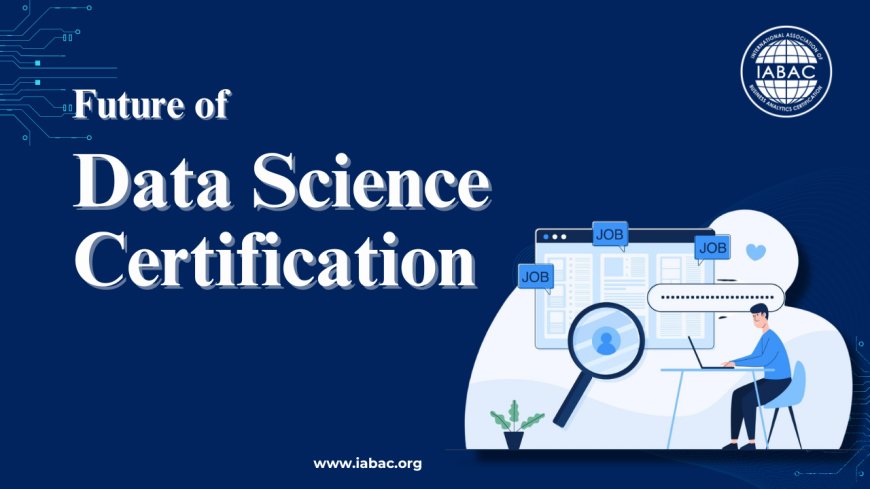Future of Data Science Certification
Discover the evolving landscape and career opportunities with a Data Science Certification. Prepare for the future of tech with specialized skills.

Data science is important in many areas because it helps companies and organizations make better decisions and improve their operations. For example, in healthcare, it helps predict diseases and personalize treatments. In finance, it's used for identifying potential fraud and assessing risks. Retail companies use it to manage their stock and understand customer preferences. In manufacturing, it helps with machine maintenance and planning product needs. Technology companies rely on it to develop new products and make their services more secure.
Regarding career development for data scientists, earning certifications is very useful. These certifications show that a person knows their field well, making it easier for them to find jobs. They also help data scientists move forward in their careers by proving that they are committed to learning new things. Certifications also provide chances to meet other professionals, which can lead to new job opportunities. Keeping up with new knowledge through certifications ensures that data scientists can stay relevant and effective at their jobs.
Evolving Industry Needs
The role of data science is expanding as different industries incorporate data-driven decision-making into their operations. Here’s a simpler breakdown of the trends in data science skills and the sectors that heavily use data science:
Trends in Data Science Skills and Qualifications
1. Advanced AI and Machine Learning: Professionals need to know more than basic algorithms; they should understand complex AI technologies like deep learning
2. Data Engineering: Handling big data efficiently is crucial, so skills in building data pipelines and managing databases are important.
3. Cloud Computing: Knowledge of platforms like AWS, Azure, and Google Cloud is important for storing and processing large datasets.
4. Data Ethics and Privacy: Understanding how to handle data legally and ethically, especially with strict data protection laws, is essential.
5. Business Skills and Communication: Connecting technical data insights with business strategies requires good communication and problem-solving skills.
Sectors That Rely on Data Science
1. Healthcare: Data science helps in developing treatments and managing costs, with skills in bioinformatics and medical data analysis being important.
2. Financial Services: Data science is used for detecting fraud and managing risks, needing skills in quantitative analysis and predictive modeling.
3. Retail and E-commerce: This sector uses data science for customer personalization and inventory management, requiring predictive analytics skills.
4. Manufacturing: Data science optimizes production and manages supply chains, with skills in analyzing IoT data being important.
5. Transportation and Logistics: Optimizing routes and improving efficiency are key uses of data science, needing skills in geographic data analysis.
6. Entertainment and Media: Companies use data science for recommending content and analyzing customer preferences, with machine learning skills being valuable.
These insights show how data science is becoming integral to various sectors, requiring a mix of technical and business-oriented skills.
Technological Advancements Impacting Certifications
Emerging technologies like artificial intelligence (AI), machine learning, and big data are changing how data scientists work. AI helps create systems that can think and learn like humans, making it easier to handle tasks that involve understanding and decision-making. Machine learning is a part of AI focused on building programs that learn from data and improve over time without human intervention. Big data involves analyzing very large sets of data to find patterns and insights that help in decision-making.
These technologies are shaping what needs to be included in data science certifications. As AI and machine learning become more common, certifications are beginning to cover these areas more deeply. This means teaching data scientists how to use new tools and methods to handle large and complex data sets effectively. Certifications are updating their courses to include these new technologies, helping data scientists stay up-to-date with the skills required in a technology-driven world.
Changes in Certification Standards
As technology continues to evolve, the way data science certifications are structured is likely to change too. One major shift could be the inclusion of real-world projects in the certification process. This means that instead of just taking tests, people might have to complete actual data science projects that show they can apply what they’ve learned in real-life situations. Also, peer reviews could become a part of the certification process, where other data scientists review and provide feedback on these projects, helping ensure the work meets industry standards.
There's also a growing possibility that global standards for data science certifications might be developed. This would mean that the same set of requirements would be recognized in different countries, making it easier for data scientists to work internationally. Standardized certifications could help companies feel more confident in hiring data scientists because they would know exactly what skills and knowledge the certified individuals possess, regardless of where they earned their certification.
The Role of Continuous Learning
In the rapidly evolving field of data science, continuous learning is not just beneficial; it's necessary. Here’s how ongoing education is crucial for staying relevant and how future certifications might adapt to include continuous learning elements:
Why Continuous Education Matters in Data Science
1. Keeping Up to Date: Data science is a rapidly changing field. Regular learning is essential to keep up with new tools, algorithms, and technologies.
2. Adapting to Industry Needs: As industries increasingly rely on data science, the standards and requirements for projects and positions are also evolving. Continuous learning allows professionals to adapt to these shifts.
3. Career Advancement: Continual education can open up new career paths and opportunities, showing employers a dedication to staying current in their field.
4. Innovation and Development: Being current with the latest studies and techniques helps data scientists drive innovation in their projects and organizations.
Future Directions for Data Science Certifications
Looking ahead, certifications in data science could integrate continuous learning in several ways to ensure ongoing relevance and proficiency:
1. Dynamic Certification Content: Certifications could be updated frequently to mirror the latest advancements in the field, ensuring they remain relevant.
2. Mandatory Re-certification: To maintain certification, professionals might need to demonstrate ongoing learning through periodic exams or proof of continuing education.
3. Specialized Micro-Credentials: Adding specialized courses to certifications could allow professionals to focus on emerging areas and technologies, offering flexibility and up-to-date knowledge.
4. Use of Digital Badges: Certifications could incorporate digital badges that reflect completed continuing education units, verified securely with blockchain, enhancing transparency and credibility.
5. Engagement with Professional Networks: Certification programs could also encourage or require involvement in professional networks that facilitate workshops, seminars, and conferences, promoting a culture of continuous learning.
Certification and Career Advancements
In the future, data science certifications might become more tailored to specific industries, offering specializations in areas like healthcare, finance, or technology. This means that a data scientist could get certified not just in general data science skills, but also in applying those skills specifically to problems and data sets in a particular industry. This kind of specialized knowledge could make a data scientist much more valuable to companies in that industry.
With more specialized certifications available, certified professionals could see better career opportunities and growth. Having a certification in a specific area of data science could help someone stand out in job applications and be more likely to get promotions. It shows employers that the person is not only skilled in data science but also an expert in applying it to their particular field. This can lead to more job offers, higher salaries, and faster career progression.
Global Trends in Data Science Certification
Data science certifications vary globally because different regions have specific needs and regulations. For instance, Europe places a high priority on data privacy due to stringent laws, while Asian countries might focus more on efficiently managing large volumes of data due to rapid technological growth.
There is a move towards establishing international standards for data science certifications, driven by the need for consistency across borders. This would help professionals work internationally and ensure that multinational companies can easily understand the qualifications of potential hires, regardless of where they earned their certifications. Multinational corporations, with their global operations, are particularly influential in shaping these certification standards to suit their universal business requirements.
Data science certifications are likely to continue evolving, reflecting technological advancements and the global integration of business practices. As the field grows, we may see more standardized certifications that align with international regulations and technological shifts, influenced by the needs of multinational corporations. For data science professionals, staying adaptable and continuously updating their skills is crucial. Engaging in ongoing education, participating in professional networks, and keeping up with industry trends will be key to staying relevant and competitive in this dynamic field.











































